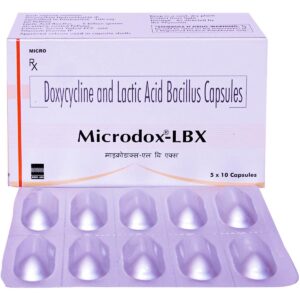DOXYCYCLINE + LACTO BACILLUS
Doxycycline: Doxycycline is an antibiotic drug that belongs to the tetracycline class. It is commonly used to treat bacterial infections caused by a variety of microorganisms, including respiratory tract infections, urinary tract infections, skin infections, acne, and certain sexually transmitted diseases.
The mechanism of action of doxycycline involves inhibiting the production of bacterial proteins necessary for their growth and replication. It achieves this by binding to the bacterial ribosomes, preventing the attachment of amino acids to the growing peptide chain.
The dose of doxycycline depends on the type and severity of the infection being treated. It is typically taken orally, usually with a glass of water, and can be taken with or without food. It is important to follow the instructions given by the healthcare provider or as mentioned on the prescription label.
Common side effects of doxycycline can include nausea, vomiting, diarrhea, abdominal pain, and loss of appetite. It may also cause photosensitivity, making the skin more sensitive to sunlight, resulting in sunburn-like symptoms. Rare but serious side effects include severe allergic reactions, liver toxicity, blood disorders, and a severe skin condition called Stevens-Johnson syndrome.
It is important to note that doxycycline should not be used in children under the age of eight, as it can cause permanent tooth discoloration. It may also interfere with the effectiveness of certain contraceptive methods, so additional precautions should be taken while using this medication. As with any medication, it is always recommended to consult a healthcare professional for personalized advice and guidance.
Lacto Bacillus: Lactobacillus is a type of bacteria that is commonly found in the human gastrointestinal tract and is also used as a probiotic. It is commercially available as a dietary supplement and is used to promote a healthy gut flora and improve digestion.
Mechanism of Action: Lactobacillus works by restoring the natural balance of bacteria in the gut. It can help in the digestion and absorption of nutrients and also produces certain substances such as lactic acid that create an unfavorable environment for the growth of harmful bacteria.
Use: Lactobacillus supplements are typically used to support gastrointestinal health. They can be beneficial for conditions such as diarrhea, irritable bowel syndrome (IBS), inflammatory bowel disease (IBD), and lactose intolerance. Additionally, lactobacillus is sometimes used to prevent and treat vaginal infections and urinary tract infections.
Dose: The recommended dosage of lactobacillus supplements can vary depending on the specific product and condition being treated. It is best to follow the instructions provided by the manufacturer or consult with a healthcare professional for appropriate dosing.
Side Effects: In general, lactobacillus is well-tolerated and considered safe for most individuals. However, some people may experience mild gastrointestinal symptoms such as bloating, gas, or diarrhea. These side effects are usually temporary and resolve on their own. It is important to consult a healthcare professional if any severe or persistent side effects occur.
It is worth noting that different strains of lactobacillus may have varying effects, and not all strains are effective for every health condition. It is advisable to choose a reputable brand and consult with a healthcare professional for personalized recommendations before starting lactobacillus supplementation.

